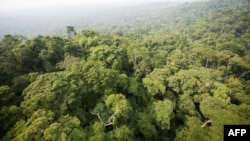Environmentalists are urging Brazilian President Michel Temer to veto a plan to remove land the size of Puerto Rico from the country's protected areas in the Amazon rainforest, fearing the move would hurt local land rights and exacerbate climate change.
The proposal to remove nearly 600,000 hectares of forest from three protected areas in the Amazon and Atlantic rainforest has been approved by Brazil's Senate. The plan is awaiting ratification from the president.
Supporters of the proposal say recession-hit Brazil needs to open up more land in the Amazon for farming, cattle ranching and mining to create jobs, alleviate poverty and spur growth.
But critics say the move will make it harder for Brazil to meet its international climate change commitments and could worsen conditions for indigenous groups and other traditional communities living in Brazil's protected areas.
"If this legislation passes it will be extremely damaging for the country," said Roberto Vamos, coordinator of the Climate Reality Project in Brazil, an environmental group in Rio de Janeiro.
Vamos told Reuters that he was concerned that eliminating protected area status would make it easier for economic interests to exploit the territory.
"People will invade, clear and start farming the land and then start faking property titles to it," he said.
The plan would reduce the size of the Jamanxim National Forest in the Amazonian state of Para in central Brazil by 486,000 hectares, and the neighboring Jamanxim National Park by 102,000 hectares.
The measures also include cutting 10,000 hectares from the Sao Joaquim National Park in southeastern Brazil in the Atlantic forest, an ecosystem which has been particularly hurt by logging.
Lawmakers who back the move say South America's largest country has plenty of protected areas and the country needs to open up land for development.
Brazil's government has pledged to reduce net deforestation to zero in the Amazon by 2030.
But environmentalists say cutting protected areas will make that goal difficult as the world's largest rainforest is viewed as one of the best natural defenses against global warming.
Amazon deforestation is rebounding from a record low in 2012.





